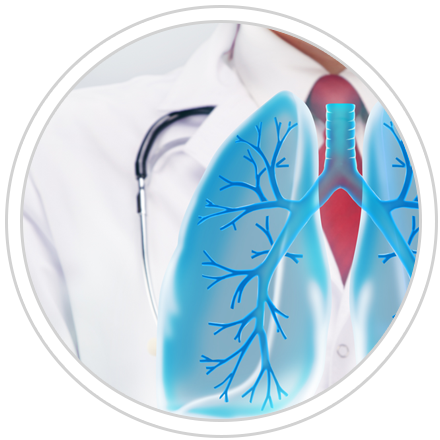Tri-City Cancer Services
Lung Cancer
 If you experience lung cancer, you’re not alone. More people around the world develop this disease than any other type of cancer. Your odds of survival improve when the condition is diagnosed early. That’s why Tri-City Medical Center in San Diego diagnoses patients with stage 1 or stage 2 lung cancer a higher percentage of the time than cancer programs in California do on average. Trust us for lung cancer care that extends your life as long as possible.
If you experience lung cancer, you’re not alone. More people around the world develop this disease than any other type of cancer. Your odds of survival improve when the condition is diagnosed early. That’s why Tri-City Medical Center in San Diego diagnoses patients with stage 1 or stage 2 lung cancer a higher percentage of the time than cancer programs in California do on average. Trust us for lung cancer care that extends your life as long as possible.
Symptoms of Lung Cancer
Symptoms of lung cancer sometimes resemble signs of other lung conditions, including bronchitis. Your doctor will accurately diagnose your condition if you experience symptoms such as:
- Persistent coughing
- Pain in your chest, shoulder or back that occurs even when you don’t cough
- A change in the color or amount of mucus that you expel
- Shortness of breath
- Hoarseness
- Unusual sounds as you breathe in
- Recurring bronchitis, pneumonia or other lung conditions
- Coughing up blood or blood-tinged mucus
Low-Dose CT Lung Cancer Screening
Because lung cancer shows no symptoms in its initial stages, a screening is the best way to detect the disease early—when treatment is most effective. Take a lung cancer risk assessment to find out if you qualify for Tri-City Medical Center’s low-dose CT lung cancer screening, a brief procedure that minimizes your radiation exposure. If the assessment indicates that you may be a candidate, request a lung cancer screening.
Reduce Your Risk of Lung Cancer
Take these steps to decrease your odds of developing lung cancer:
- Stop smoking, since cigarette use leads to about 90 percent of U.S. lung cancer deaths.
- Avoid second-hand smoke by limiting your time in places where people smoke and by asking guests not to use cigarettes in your home or car.
- Test your home for radon, a radioactive, odorless gas that causes 20,000 lung cancer deaths annually in the United States.
Diagnosing Lung Cancer
After a lung cancer screening shows abnormalities, a doctor at Tri-City Medical Center may remove a tissue sample for examination. This procedure, called a lung biopsy, helps your doctor diagnose your condition. Your physician may take the tissue sample by passing a needle through your skin and into your lungs. Or, a doctor might insert a small tube with tiny surgical tools through your mouth or nose and into your lungs.
Types of Lung Cancer
If you receive a diagnosis of lung cancer, your doctor will tell you what type of the disease you have. Types of lung cancer include:
- Non-small cell – The most common kind of lung cancer, it includes subtypes such as squamous cell carcinoma, adenocarcinoma and large cell carcinoma.
- Small cell – Also called oat cell cancer, it spreads quickly.
- Carcinoid tumors – These tumors usually grow slowly and rarely spread.
Treating Lung Cancer
Your physician at Tri-City Medical Center may recommend one or more of these lung cancer treatment options:
- Chemotherapy
- Targeted Therapy
- Radiation
- Surgery
You also may qualify for a clinical trial that tests a promising experimental therapy for lung cancer.
During and after treatment, take advantage of cancer support and wellness services that improve your qualify of life.
